Leviticus 1 meaning explained in AI Summary
The Burnt Offering
- Focus on Sacrifice: This chapter establishes the importance of sacrifice in Israelite worship. Burnt offerings were a way for individuals to express devotion to God and potentially seek atonement for sins.
- Detailed Instructions: Specific guidelines are provided for the burnt offering, including the type of animal required (unblemished male from the herd or flock), the preparation process (slaughtering, skinning, and cutting into pieces), and the placement of the offering on the altar (entire animal burned except for certain fats and entrails).
- Priestly Role: The role of the priests is highlighted. They are responsible for slaughtering the animal, arranging the offering on the altar, and ensuring the fire burns continually.
Chapter 1 of Leviticus outlines the instructions for burnt offerings, a specific type of sacrifice made to God by the Israelites.
Types of Animals:
- Bulls (male cattle): Offered by priests on behalf of the whole community or by individuals for specific vows or voluntary offerings.
- Sheep or goats: Offered by individuals who couldn't afford a bull, again for various reasons like atonement, thanksgiving, or voluntary offerings.
- Birds: Offered by the poorest individuals, particularly for purification rituals.
Procedure:
1. Presentation: The person offering the sacrifice brings the animal to the entrance of the Tent of Meeting.
2. Laying on of Hands: The offerer symbolically lays their hands on the animal's head, transferring their sins and seeking atonement.
3. Slaughter: The offerer slaughters the animal on the north side of the altar.
4. Priest's Role: The priest sprinkles the blood around the altar.
5. Preparation: The animal is skinned and cut into pieces. The entrails and legs are washed.
6. Burning: The entire animal (except the hide) is burned on the altar as a "pleasing aroma" to the Lord.
Significance:
- Atonement: The burnt offering primarily served as a way for people to seek forgiveness for their sins.
- Dedication: It symbolized complete surrender and dedication to God.
- Fellowship: The shared meal of the sacrifice (the aroma ascending to God) represented communion with God.
Overall:
Leviticus Chapter 1 emphasizes the importance of sacrifice and ritual purity in approaching a holy God. The detailed instructions highlight the seriousness of sin and the need for atonement. It also underscores the special role of the priests in mediating between God and the people.
Leviticus 1 bible study ai commentary
The burnt offering ('Olah), detailed in Leviticus 1, is the foundational sacrifice, representing complete consecration and substitutionary atonement. It is a voluntary act, a “whole ascending offering,” where the entire animal is turned to smoke, ascending to God. This signifies the worshiper's total surrender and provides a divinely appointed means for a sinner to be accepted into the presence of a holy God, prefiguring the all-sufficient sacrifice of Jesus Christ.
Leviticus 1 context
The book of Leviticus opens with God speaking to Moses not from the terrifying, distant peak of Mount Sinai, but from within the newly consecrated Tent of Meeting, the Tabernacle. This shift in location signifies a new, more intimate stage in God's relationship with Israel. He now dwells among them and is providing the specific protocols—the sacrificial system—through which His people can approach Him. This system, introduced with the term qorban (from a root meaning "to draw near"), was a gracious provision from God. It stands in stark contrast to the religious practices of the Ancient Near East (ANE), which often involved attempts to appease or manipulate capricious deities through frenzied or coercive rituals. God, instead, provides the way for relationship.
Leviticus 1:1-2
The LORD called to Moses and spoke to him from the tent of meeting, saying, “Speak to the children of Israel and say to them, When any one of you brings an offering to the LORD, you shall bring your offering of livestock from the herd or from the flock.”
In-depth-analysis
- The LORD Called: The initiative for worship and reconciliation comes from God, not man. He provides the means of approach.
- From the tent of meeting: God now speaks from the midst of His people, a more intimate setting than the thunderous Mount Sinai (Exod 19:16-19), yet His holiness still demands a specific protocol for approach.
- When any one of you brings: This phrase highlights the voluntary, individual, and personal nature of this specific offering. It is an invitation, not a mandatory tax for sin.
- Offering (
qorban): The Hebrew wordqorban(קָרְבָּן) comes from a root that means "to draw near" or "to approach." A sacrifice is fundamentally a means by which one draws near to God. - Livestock from the herd or from the flock: The offering must be a domesticated animal, not a wild one. This signifies that it comes at a personal cost to the worshiper from their own livelihood and substance.
Bible references
- Exodus 40:34-35: Then the cloud covered the tent of meeting, and the glory of the LORD filled the tabernacle... for the cloud dwelt on it. (Context for where God is speaking from).
- Hebrews 1:1-2: Long ago... God spoke to our fathers by the prophets, but in these last days he has spoken to us by his Son. (Progression of God's communication).
Cross references
Exod 25:22 (God communicating from the mercy seat), Mark 7:11 (Corban used negatively).
Leviticus 1:3
“If his offering is a burnt offering from the herd, he shall offer a male without blemish. He shall bring it to the entrance of the tent of meeting, that he may be accepted before the LORD.”
In-depth-analysis
- Burnt offering (
‘olah): From the Hebrew‘alah(עָלָה), meaning "to ascend." It is an ascending offering, signifying that the whole offering goes up to God in smoke. - Male without blemish (
tamim):Tamim(תָּמִים) means perfect, whole, sound, or complete. It cannot have any defect. This represents offering one's best to God and, prophetically, points to the sinless perfection of Christ. - At the entrance of the tent of meeting: This is a public act at the very threshold of God's dwelling place. Worship is not a private, hidden affair.
- That he may be accepted before the LORD: The Hebrew here (
lirtsono- לִרְצֹנוֹ) has a dual meaning: it can mean the offering is brought "of his own voluntary will," but it can also mean it is brought "for his acceptance." Theologically, both are true: the worshiper comes willingly, accepting God's gracious provision to make him acceptable.
Bible references
- 1 Peter 1:18-19: ...you were ransomed... with the precious blood of Christ, like that of a lamb without blemish or spot. (Christ as the perfect
tamimsacrifice). - Ephesians 5:2: And walk in love, as Christ loved us and gave himself up for us, a fragrant offering and sacrifice to God. (Christ's sacrifice makes us acceptable).
- Philippians 2:8: And being found in human form, he humbled himself by becoming obedient to the point of death, even death on a cross. (Christ's voluntary will).
Cross references
Heb 9:14 (Christ offered Himself without blemish), Mal 1:8, 14 (rebuke for offering blemished animals), Eph 1:6 (accepted in the Beloved).
Leviticus 1:4
“He shall lay his hand on the head of the burnt offering, and it shall be accepted for him to make atonement for him.”
In-depth-analysis
- Lay his hand on the head: The Hebrew
samak(סָמַךְ) implies a forceful leaning, not a light touch. This is the crucial act of identification and transference. The worshiper identifies the animal as his personal substitute, and his sin/unworthiness is symbolically transferred to it. - It shall be accepted for him: The perfect substitute is accepted by God in the place of the imperfect worshiper.
- To make atonement (
lekhapper): From the rootkaphar(כָּפַר), meaning "to cover," "to ransom," or "to pacify." The life of the substitute covers the sin of the worshiper, satisfying God's justice and allowing for relationship. This is the theological core of the sacrificial act.
Bible references
- Isaiah 53:6: All we like sheep have gone astray... and the LORD has laid on him the iniquity of us all. (The ultimate substitution and transference).
- 2 Corinthians 5:21: For our sake he made him to be sin who knew no sin, so that in him we might become the righteousness of God. (The great exchange fulfilled in Christ).
- Leviticus 16:21: Aaron shall lay both his hands on the head of the live goat, and confess over it all the iniquities of the people of Israel. (Explicit parallel with the scapegoat on the Day of Atonement).
Cross references
Exod 29:10 (laying on of hands in priest's ordination), Rom 3:25 (Christ as the propitiation/atonement).
Leviticus 1:5-9
“Then he shall kill the bull before the LORD, and Aaron's sons the priests shall bring the blood and throw the blood against the sides of the altar... And the priest shall burn all of it on the altar, as a burnt offering, a food offering with a pleasing aroma to the LORD.”
In-depth-analysis
- He shall kill the bull: The worshiper, the sinner, personally carries out the death sentence on his substitute. This was a visceral, bloody, and sobering act, demonstrating the deadly consequence of sin.
- Priests shall bring the blood: While the worshiper kills, the priests, as mediators, handle the blood. The blood represents life (
nefesh) and is the sole agent of atonement. They apply it to the altar, bringing the 'life' given in death into contact with God's presence. - Flay... cut it into pieces: The animal is opened up, ensuring no hidden blemishes exist and allowing the fire to consume it completely. This symbolizes total transparency before God and a complete offering.
- Wash its entrails and its legs: Even the internal, "unclean" parts must be cleansed, symbolizing the need for inner purity and holiness, not just outward conformity.
- Burn all of it on the altar: This is unique to the burnt offering. Total consumption signifies complete devotion, surrender, and consecration to God. Nothing is held back.
- A pleasing aroma (
reach nichoach): This is an anthropomorphism. It doesn't mean God enjoys the smell of burning meat. It is a stock phrase in ANE treaty contexts signifying that a covenant relationship has been restored and that the offended party (God) is satisfied. The debt is paid.
Bible references
- Leviticus 17:11: For the life of the flesh is in the blood, and I have given it for you on the altar to make atonement for your souls. (The principle of blood atonement).
- Hebrews 9:22: Indeed, under the law almost everything is purified with blood, and without the shedding of blood there is no forgiveness. (NT confirmation of the blood's necessity).
- Romans 12:1: I appeal to you therefore, brothers... to present your bodies as a living sacrifice, holy and acceptable to God. (The believer's response, a living
'olah').
Cross references
Gen 8:21 (Noah's offering a pleasing aroma), Eph 5:2 (Christ as a fragrant offering), Heb 12:24 (Jesus's sprinkled blood speaks a better word).
Polemics
Unlike pagan rituals which sometimes involved frenzied dismemberment of animals (or humans), the Israelite process is deliberate, orderly, and prescribed. The focus is on atonement and restoring a relationship with a holy God, not on ecstatic experiences or manipulating divine favor.
Leviticus 1:10-13
“If his gift for a burnt offering is from the flock, from the sheep or goats, he shall bring a male without blemish... He shall kill it on the north side of the altar before the LORD...”
In-depth-analysis
- From the flock, from the sheep or goats: This section outlines the procedure for a less expensive animal. This provision demonstrates that access to God is not based on wealth. The theological principles of substitution and atonement remain identical.
- North side of the altar: This specific location is unique to this offering. The theological significance is debated. Some scholars suggest a connection to ancient cosmic geography where the north was associated with the divine mountain or dwelling of God (as in Ps 48:2, Isa 14:13). Others see it as a simple matter of practical arrangement in the courtyard. Regardless, it shows God cares about the specific details of worship.
Bible references
- 2 Corinthians 8:12: For if the readiness is there, it is acceptable according to what a person has, not according to what he does not have. (God looks at the heart and means, not just the raw value).
- Mark 12:43-44: ...this poor widow has put in more than all... for she out of her poverty has put in everything she had. (The principle of sacrificial giving).
Cross references
Lev 5:7 (provision for the poor in the purification offering), 1 Cor 1:26-29 (God choosing the humble).
Leviticus 1:14-17
“If his offering to the LORD is a burnt offering of birds, then he shall bring his offering of turtledoves or pigeons... The priest shall wring off its head and burn it on the altar... He shall tear it open by its wings, but shall not sever it completely...”
In-depth-analysis
- Offering of birds: This is the provision for the poorest individuals. God ensures that no one is barred from worship and atonement due to poverty.
- The priest shall wring off its head: Here, the priest performs the entire ritual. This is a key difference. It is likely because the small bird was too delicate for an untrained person to handle properly according to the law, and because the value was so low the worshiper gave the whole animal to the priest for the service.
- Tear it open... but shall not sever it completely: This unique action may symbolize a brokenness that is still held together by God, or it may simply be a practical instruction for preparing a small bird for burning.
- Its crop with its contents... beside the altar on the east side, in the place for ashes: The undigested food is refuse and must be removed, representing the removal of filth, and placed on the official ash heap.
Bible references
- Luke 2:24: ...and to offer a sacrifice according to what is said in the Law of the Lord, "a pair of turtledoves, or two young pigeons." (Mary and Joseph were poor and brought this very offering).
- Leviticus 5:11: But if he cannot afford two turtledoves or two pigeons... (Explicit statement on poverty offerings).
Cross references
Gen 15:9-10 (Abram's covenant involves birds, but severed), Lev 12:8 (bird offering after childbirth).
Leviticus chapter 1 analysis
- Socio-Economic Grace: The structure of the chapter, moving from the most expensive offering (bull) to the least (bird), is a powerful statement. God's grace and the means of atonement are accessible to all, regardless of their economic status. The heart of the worshiper matters more than the monetary value of the gift.
- The Worshiper's Role vs. The Priest's Role:| Role | The Worshiper | The Priest (Mediator) || :--- | :--- | :--- || Action | Brings the offering, identifies with it (lays hands), kills it. | Manages the blood (atonement agent), places the pieces on the altar, ensures the offering "ascends" correctly to God. |This division emphasizes that while we are personally responsible for our sin and its consequence (death), it is only through God's appointed mediator and the handling of the atoning blood that we are made right with Him.
- The Gospel According to Leviticus 1: The burnt offering is a rich picture of the Gospel of Jesus Christ:
- Divine Initiative: God called from the tent; God sent His Son (John 3:16).
- Voluntary Offering: "When any of you brings"; Christ gave himself willingly (John 10:18).
- Perfection: "Without blemish" (
tamim); Christ was sinless (Heb 4:15, 1 Pet 1:19). - Substitution: "Lay his hand on the head"; The Lord laid on Him the iniquity of us all (Isa 53:6).
- Atoning Death: The animal is killed; Christ died for our sins (Rom 5:8).
- Blood for Atonement: Blood is dashed on the altar; "without the shedding of blood there is no forgiveness" (Heb 9:22).
- Total Consecration: "Burn all of it"; Christ held nothing back, completely fulfilling the Father's will.
- Divine Acceptance: "A pleasing aroma"; God was satisfied with Christ's sacrifice (Eph 5:2).
Leviticus 1 summary
Leviticus 1 outlines the laws for the burnt offering ('olah), a voluntary sacrifice symbolizing total surrender and substitutionary atonement. It details a specific, orderly process for a bull, a sheep/goat, or a bird, ensuring that all Israelites, rich or poor, had a way to approach God. Key actions include the worshiper identifying with a blemish-free animal and the priest applying its blood for atonement. The entire animal ascending in smoke signifies complete consecration and results in a "pleasing aroma," indicating God's satisfaction. This whole ritual serves as a profound Old Testament type, foreshadowing the perfect, voluntary, and all-sufficient sacrifice of Jesus Christ.
Leviticus 1 AI Image Audio and Video









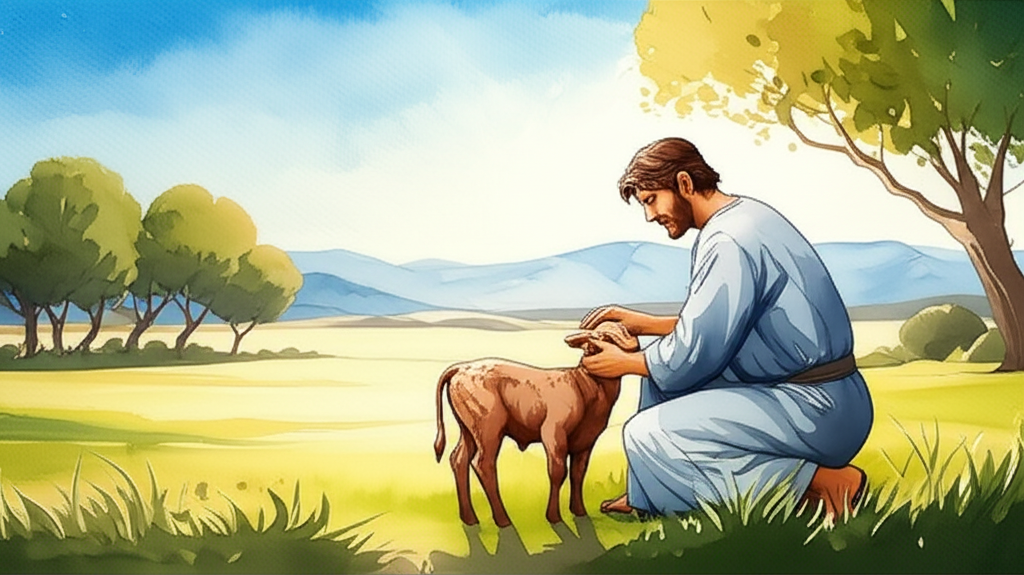
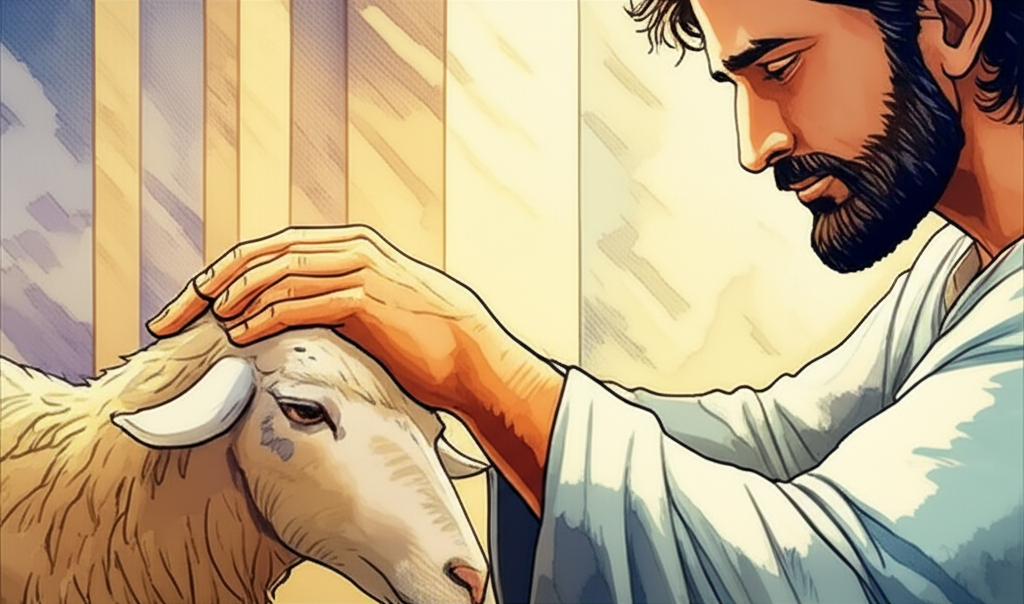
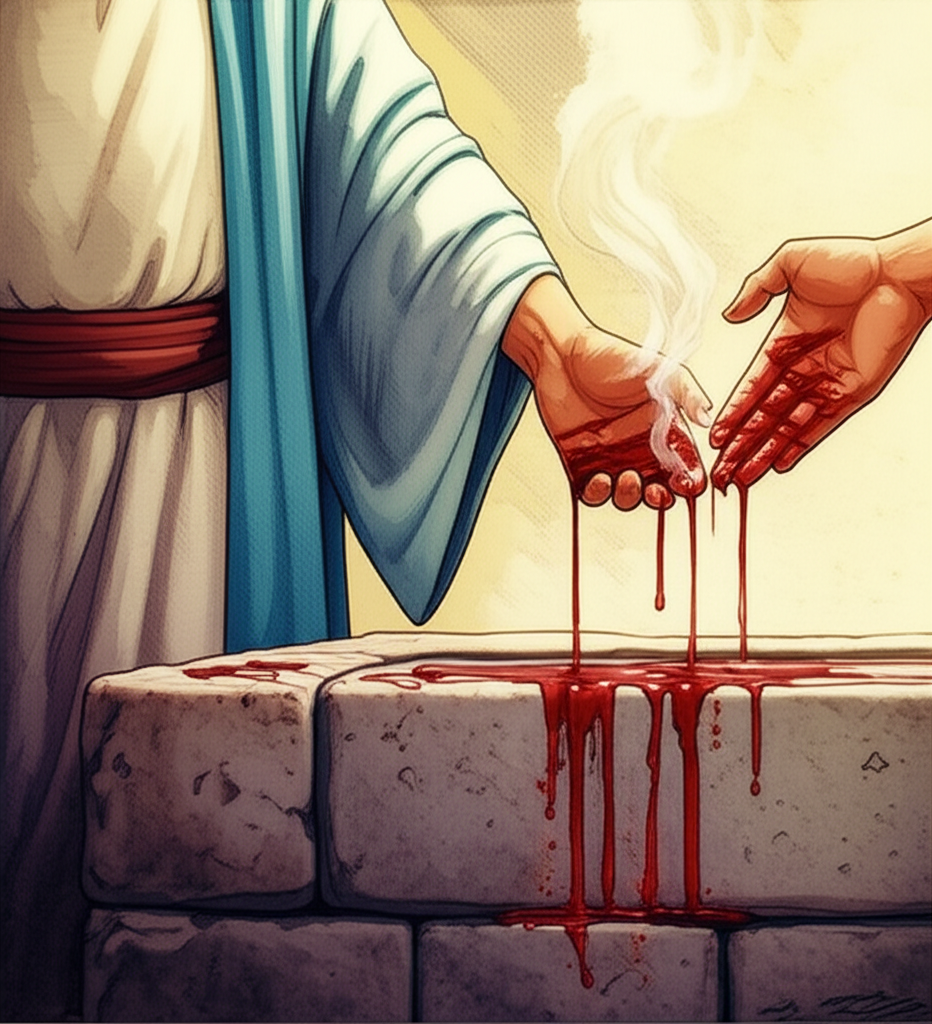

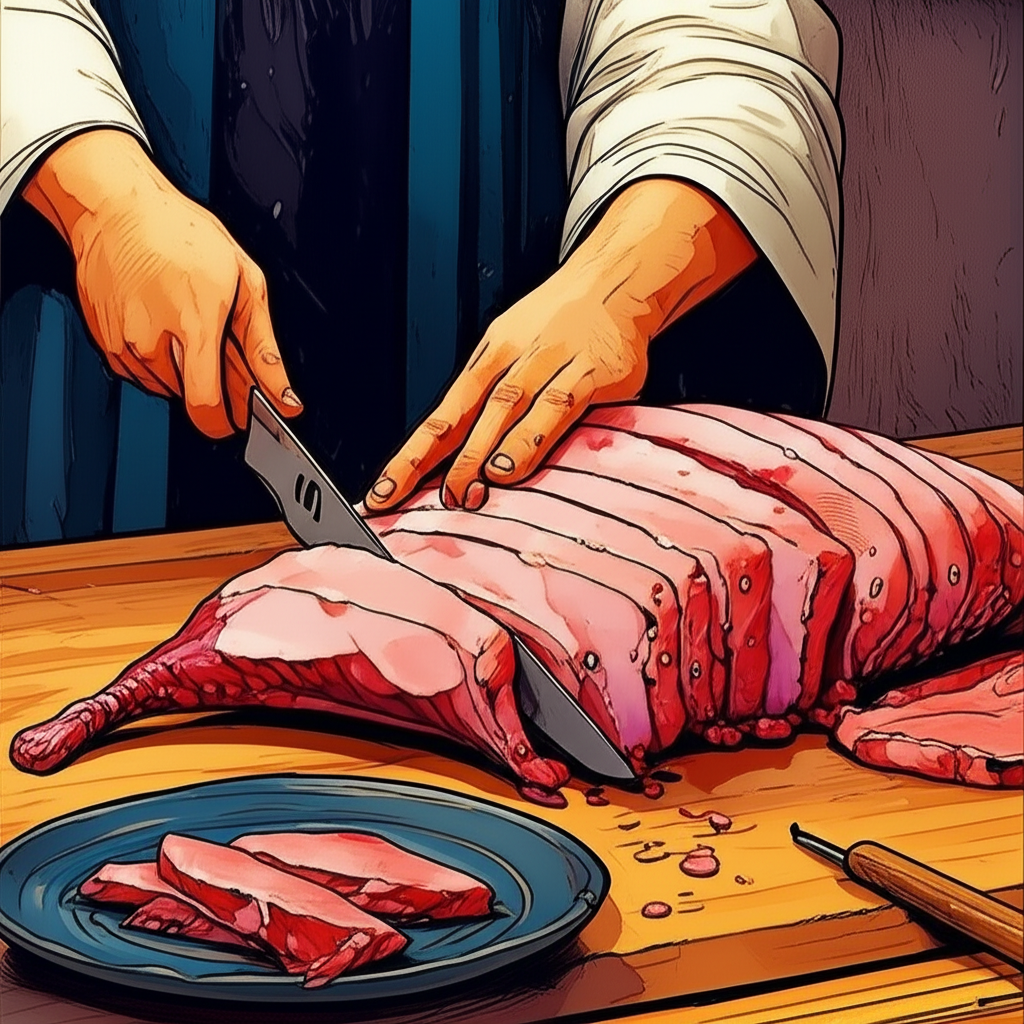

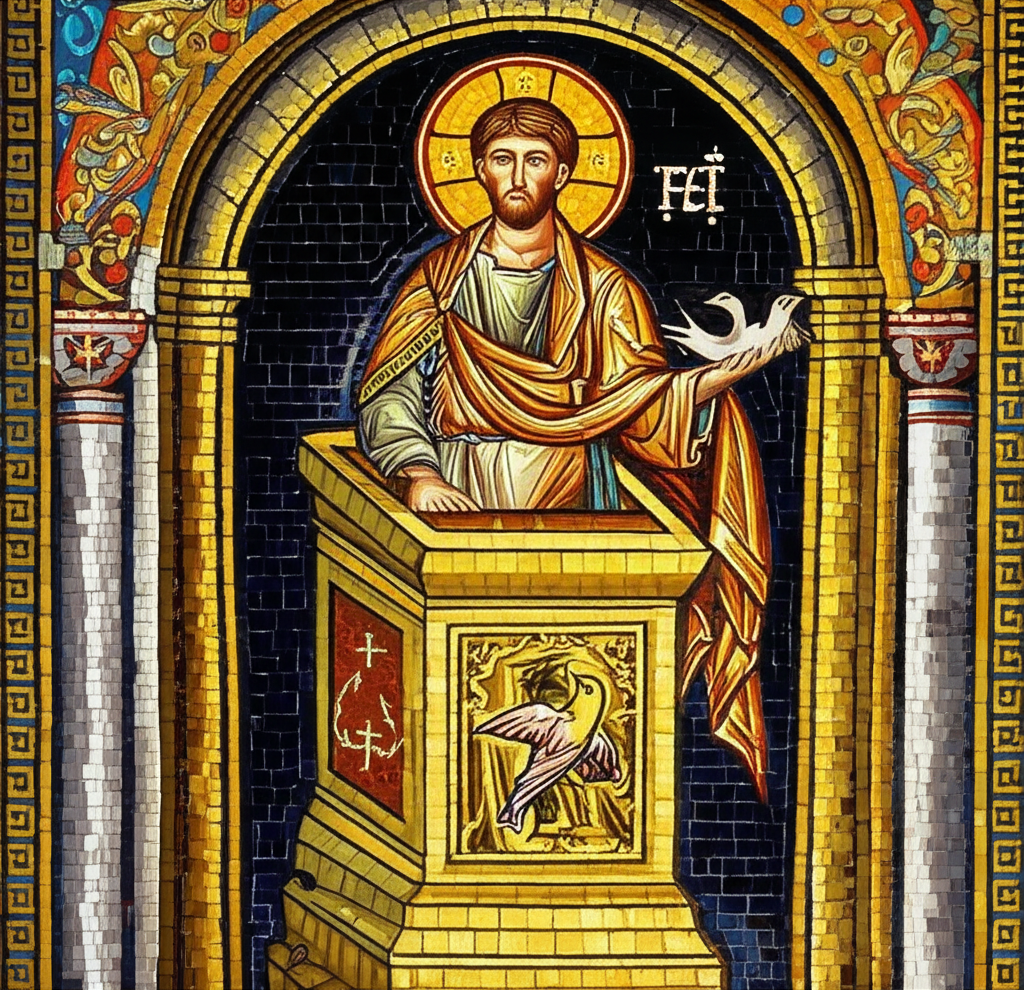
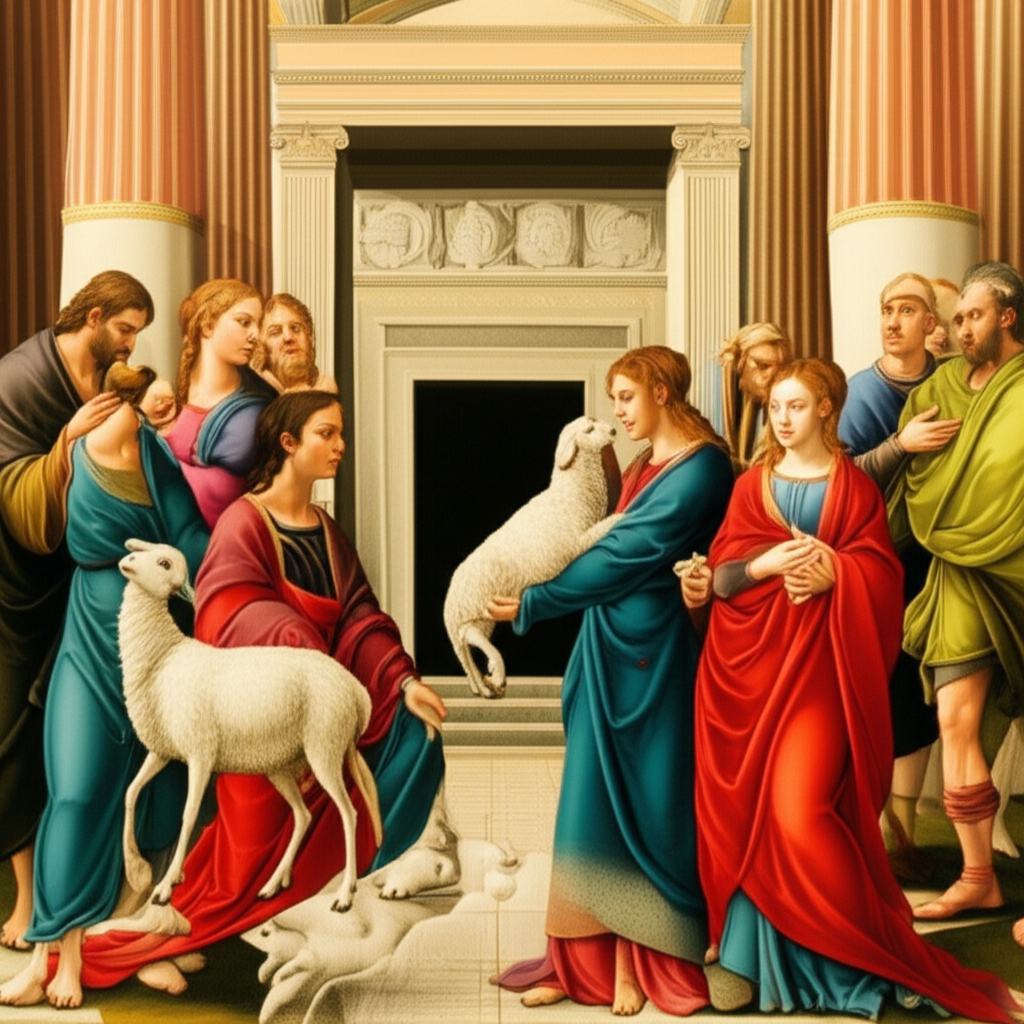
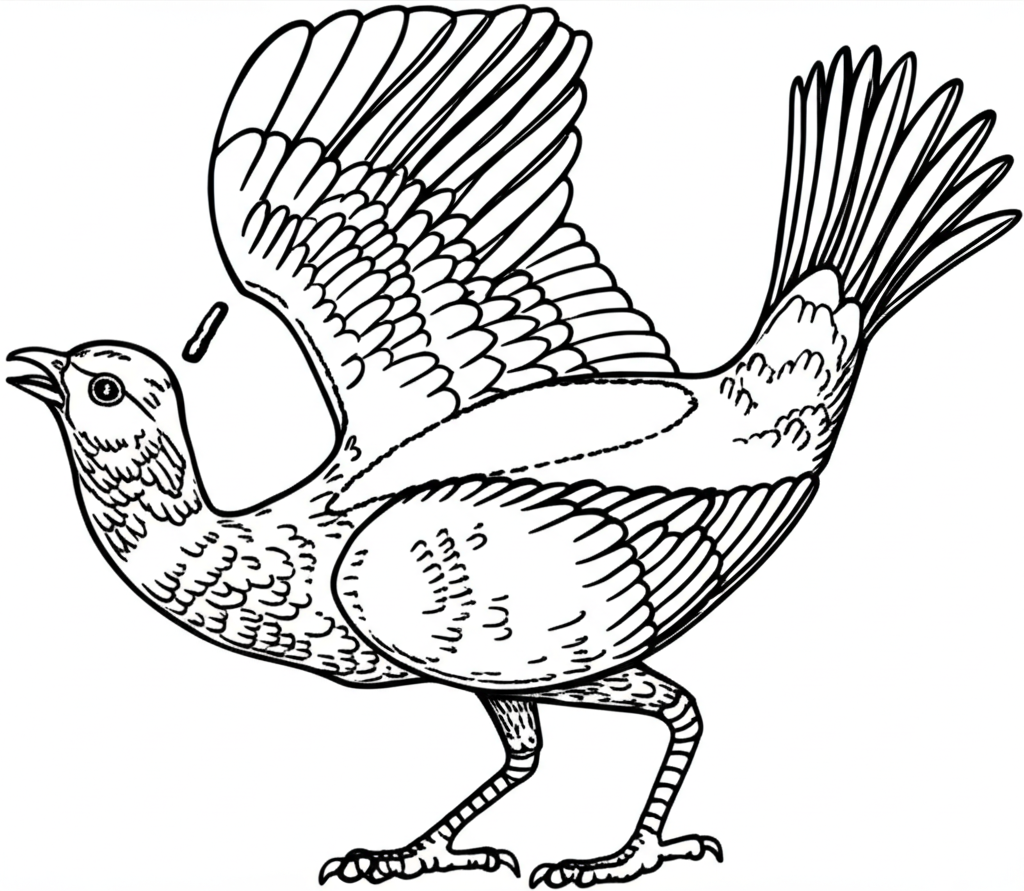
Leviticus chapter 1 kjv
- 1 And the LORD called unto Moses, and spake unto him out of the tabernacle of the congregation, saying,
- 2 Speak unto the children of Israel, and say unto them, If any man of you bring an offering unto the LORD, ye shall bring your offering of the cattle, even of the herd, and of the flock.
- 3 If his offering be a burnt sacrifice of the herd, let him offer a male without blemish: he shall offer it of his own voluntary will at the door of the tabernacle of the congregation before the LORD.
- 4 And he shall put his hand upon the head of the burnt offering; and it shall be accepted for him to make atonement for him.
- 5 And he shall kill the bullock before the LORD: and the priests, Aaron's sons, shall bring the blood, and sprinkle the blood round about upon the altar that is by the door of the tabernacle of the congregation.
- 6 And he shall flay the burnt offering, and cut it into his pieces.
- 7 And the sons of Aaron the priest shall put fire upon the altar, and lay the wood in order upon the fire:
- 8 And the priests, Aaron's sons, shall lay the parts, the head, and the fat, in order upon the wood that is on the fire which is upon the altar:
- 9 But his inwards and his legs shall he wash in water: and the priest shall burn all on the altar, to be a burnt sacrifice, an offering made by fire, of a sweet savor unto the LORD.
- 10 And if his offering be of the flocks, namely, of the sheep, or of the goats, for a burnt sacrifice; he shall bring it a male without blemish.
- 11 And he shall kill it on the side of the altar northward before the LORD: and the priests, Aaron's sons, shall sprinkle his blood round about upon the altar.
- 12 And he shall cut it into his pieces, with his head and his fat: and the priest shall lay them in order on the wood that is on the fire which is upon the altar:
- 13 But he shall wash the inwards and the legs with water: and the priest shall bring it all, and burn it upon the altar: it is a burnt sacrifice, an offering made by fire, of a sweet savor unto the LORD.
- 14 And if the burnt sacrifice for his offering to the LORD be of fowls, then he shall bring his offering of turtledoves, or of young pigeons.
- 15 And the priest shall bring it unto the altar, and wring off his head, and burn it on the altar; and the blood thereof shall be wrung out at the side of the altar:
- 16 And he shall pluck away his crop with his feathers, and cast it beside the altar on the east part, by the place of the ashes:
- 17 And he shall cleave it with the wings thereof, but shall not divide it asunder: and the priest shall burn it upon the altar, upon the wood that is upon the fire: it is a burnt sacrifice, an offering made by fire, of a sweet savor unto the LORD.
Leviticus chapter 1 nkjv
- 1 Now the LORD called to Moses, and spoke to him from the tabernacle of meeting, saying,
- 2 "Speak to the children of Israel, and say to them: 'When any one of you brings an offering to the LORD, you shall bring your offering of the livestock?of the herd and of the flock.
- 3 'If his offering is a burnt sacrifice of the herd, let him offer a male without blemish; he shall offer it of his own free will at the door of the tabernacle of meeting before the LORD.
- 4 Then he shall put his hand on the head of the burnt offering, and it will be accepted on his behalf to make atonement for him.
- 5 He shall kill the bull before the LORD; and the priests, Aaron's sons, shall bring the blood and sprinkle the blood all around on the altar that is by the door of the tabernacle of meeting.
- 6 And he shall skin the burnt offering and cut it into its pieces.
- 7 The sons of Aaron the priest shall put fire on the altar, and lay the wood in order on the fire.
- 8 Then the priests, Aaron's sons, shall lay the parts, the head, and the fat in order on the wood that is on the fire upon the altar;
- 9 but he shall wash its entrails and its legs with water. And the priest shall burn all on the altar as a burnt sacrifice, an offering made by fire, a sweet aroma to the LORD.
- 10 'If his offering is of the flocks?of the sheep or of the goats?as a burnt sacrifice, he shall bring a male without blemish.
- 11 He shall kill it on the north side of the altar before the LORD; and the priests, Aaron's sons, shall sprinkle its blood all around on the altar.
- 12 And he shall cut it into its pieces, with its head and its fat; and the priest shall lay them in order on the wood that is on the fire upon the altar;
- 13 but he shall wash the entrails and the legs with water. Then the priest shall bring it all and burn it on the altar; it is a burnt sacrifice, an offering made by fire, a sweet aroma to the LORD.
- 14 'And if the burnt sacrifice of his offering to the LORD is of birds, then he shall bring his offering of turtledoves or young pigeons.
- 15 The priest shall bring it to the altar, wring off its head, and burn it on the altar; its blood shall be drained out at the side of the altar.
- 16 And he shall remove its crop with its feathers and cast it beside the altar on the east side, into the place for ashes.
- 17 Then he shall split it at its wings, but shall not divide it completely; and the priest shall burn it on the altar, on the wood that is on the fire. It is a burnt sacrifice, an offering made by fire, a sweet aroma to the LORD.
Leviticus chapter 1 niv
- 1 The LORD called to Moses and spoke to him from the tent of meeting. He said,
- 2 "Speak to the Israelites and say to them: 'When anyone among you brings an offering to the LORD, bring as your offering an animal from either the herd or the flock.
- 3 "?'If the offering is a burnt offering from the herd, you are to offer a male without defect. You must present it at the entrance to the tent of meeting so that it will be acceptable to the LORD.
- 4 You are to lay your hand on the head of the burnt offering, and it will be accepted on your behalf to make atonement for you.
- 5 You are to slaughter the young bull before the LORD, and then Aaron's sons the priests shall bring the blood and splash it against the sides of the altar at the entrance to the tent of meeting.
- 6 You are to skin the burnt offering and cut it into pieces.
- 7 The sons of Aaron the priest are to put fire on the altar and arrange wood on the fire.
- 8 Then Aaron's sons the priests shall arrange the pieces, including the head and the fat, on the wood that is burning on the altar.
- 9 You are to wash the internal organs and the legs with water, and the priest is to burn all of it on the altar. It is a burnt offering, a food offering, an aroma pleasing to the LORD.
- 10 "?'If the offering is a burnt offering from the flock, from either the sheep or the goats, you are to offer a male without defect.
- 11 You are to slaughter it at the north side of the altar before the LORD, and Aaron's sons the priests shall splash its blood against the sides of the altar.
- 12 You are to cut it into pieces, and the priest shall arrange them, including the head and the fat, on the wood that is burning on the altar.
- 13 You are to wash the internal organs and the legs with water, and the priest is to bring all of them and burn them on the altar. It is a burnt offering, a food offering, an aroma pleasing to the LORD.
- 14 "?'If the offering to the LORD is a burnt offering of birds, you are to offer a dove or a young pigeon.
- 15 The priest shall bring it to the altar, wring off the head and burn it on the altar; its blood shall be drained out on the side of the altar.
- 16 He is to remove the crop and the feathers and throw them down east of the altar where the ashes are.
- 17 He shall tear it open by the wings, not dividing it completely, and then the priest shall burn it on the wood that is burning on the altar. It is a burnt offering, a food offering, an aroma pleasing to the LORD.
Leviticus chapter 1 esv
- 1 The LORD called Moses and spoke to him from the tent of meeting, saying,
- 2 "Speak to the people of Israel and say to them, When any one of you brings an offering to the LORD, you shall bring your offering of livestock from the herd or from the flock.
- 3 "If his offering is a burnt offering from the herd, he shall offer a male without blemish. He shall bring it to the entrance of the tent of meeting, that he may be accepted before the LORD.
- 4 He shall lay his hand on the head of the burnt offering, and it shall be accepted for him to make atonement for him.
- 5 Then he shall kill the bull before the LORD, and Aaron's sons the priests shall bring the blood and throw the blood against the sides of the altar that is at the entrance of the tent of meeting.
- 6 Then he shall flay the burnt offering and cut it into pieces,
- 7 and the sons of Aaron the priest shall put fire on the altar and arrange wood on the fire.
- 8 And Aaron's sons the priests shall arrange the pieces, the head, and the fat, on the wood that is on the fire on the altar;
- 9 but its entrails and its legs he shall wash with water. And the priest shall burn all of it on the altar, as a burnt offering, a food offering with a pleasing aroma to the LORD.
- 10 "If his gift for a burnt offering is from the flock, from the sheep or goats, he shall bring a male without blemish,
- 11 and he shall kill it on the north side of the altar before the LORD, and Aaron's sons the priests shall throw its blood against the sides of the altar.
- 12 And he shall cut it into pieces, with its head and its fat, and the priest shall arrange them on the wood that is on the fire on the altar,
- 13 but the entrails and the legs he shall wash with water. And the priest shall offer all of it and burn it on the altar; it is a burnt offering, a food offering with a pleasing aroma to the LORD.
- 14 "If his offering to the LORD is a burnt offering of birds, then he shall bring his offering of turtledoves or pigeons.
- 15 And the priest shall bring it to the altar and wring off its head and burn it on the altar. Its blood shall be drained out on the side of the altar.
- 16 He shall remove its crop with its contents and cast it beside the altar on the east side, in the place for ashes.
- 17 He shall tear it open by its wings, but shall not sever it completely. And the priest shall burn it on the altar, on the wood that is on the fire. It is a burnt offering, a food offering with a pleasing aroma to the LORD.
Leviticus chapter 1 nlt
- 1 The LORD called to Moses from the Tabernacle and said to him,
- 2 "Give the following instructions to the people of Israel. When you present an animal as an offering to the LORD, you may take it from your herd of cattle or your flock of sheep and goats.
- 3 "If the animal you present as a burnt offering is from the herd, it must be a male with no defects. Bring it to the entrance of the Tabernacle so you may be accepted by the LORD.
- 4 Lay your hand on the animal's head, and the LORD will accept its death in your place to purify you, making you right with him.
- 5 Then slaughter the young bull in the LORD's presence, and Aaron's sons, the priests, will present the animal's blood by splattering it against all sides of the altar that stands at the entrance to the Tabernacle.
- 6 Then skin the animal and cut it into pieces.
- 7 The sons of Aaron the priest will build a wood fire on the altar.
- 8 They will arrange the pieces of the offering, including the head and fat, on the wood burning on the altar.
- 9 But the internal organs and the legs must first be washed with water. Then the priest will burn the entire sacrifice on the altar as a burnt offering. It is a special gift, a pleasing aroma to the LORD.
- 10 "If the animal you present as a burnt offering is from the flock, it may be either a sheep or a goat, but it must be a male with no defects.
- 11 Slaughter the animal on the north side of the altar in the LORD's presence, and Aaron's sons, the priests, will splatter its blood against all sides of the altar.
- 12 Then cut the animal in pieces, and the priests will arrange the pieces of the offering, including the head and fat, on the wood burning on the altar.
- 13 But the internal organs and the legs must first be washed with water. Then the priest will burn the entire sacrifice on the altar as a burnt offering. It is a special gift, a pleasing aroma to the LORD.
- 14 "If you present a bird as a burnt offering to the LORD, choose either a turtledove or a young pigeon.
- 15 The priest will take the bird to the altar, wring off its head, and burn it on the altar. But first he must drain its blood against the side of the altar.
- 16 The priest must also remove the crop and the feathers and throw them in the ashes on the east side of the altar.
- 17 Then, grasping the bird by its wings, the priest will tear the bird open, but without tearing it apart. Then he will burn it as a burnt offering on the wood burning on the altar. It is a special gift, a pleasing aroma to the LORD.
- Bible Book of Leviticus
- 1 Laws for Burnt Offerings
- 2 Laws for Grain Offerings
- 3 Laws for Peace Offerings
- 4 Sacrifies for Sin
- 5 Laws for Guilt Offerings
- 6 The Priests and the Offerings
- 7 Law of the trespass offering
- 8 Consecration of Aaron and His Sons
- 9 The Lord Accepts Aaron's Offering
- 10 The Death of Nadab and Abihu
- 11 Clean and unclean Animals
- 12 Purification After Childbirth
- 13 Laws About Leprosy
- 14 Laws for Cleansing Lepers
- 15 Sperm Discharge and Menstruation cycle
- 16 Day of Atonement
- 17 The Place of Sacrifice
- 18 Unlawful Sexual Relations
- 19 Levitical Laws for Levites
- 20 Punishment for Child Sacrifice
- 21 Holiness and the Priests
- 22 Acceptable Offerings
- 23 The Feasts of the Lord
- 24 The Lamps
- 25 Year of Jubilee
- 26 Blessings for Obedience
- 27 Laws About Vows